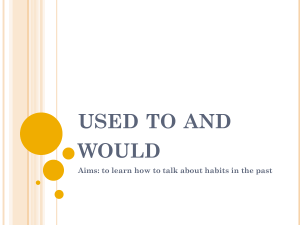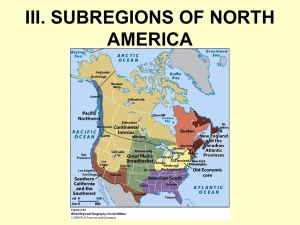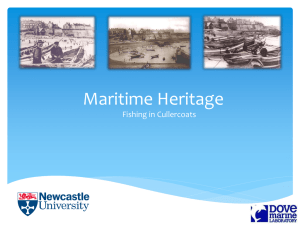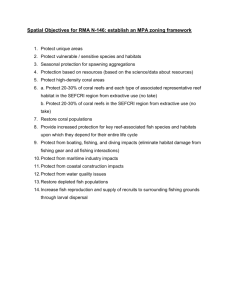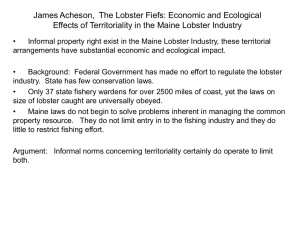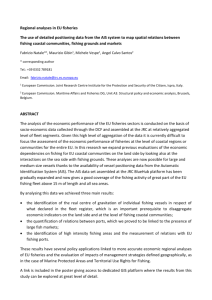Proposal to manage non-commercial pot fishing
advertisement
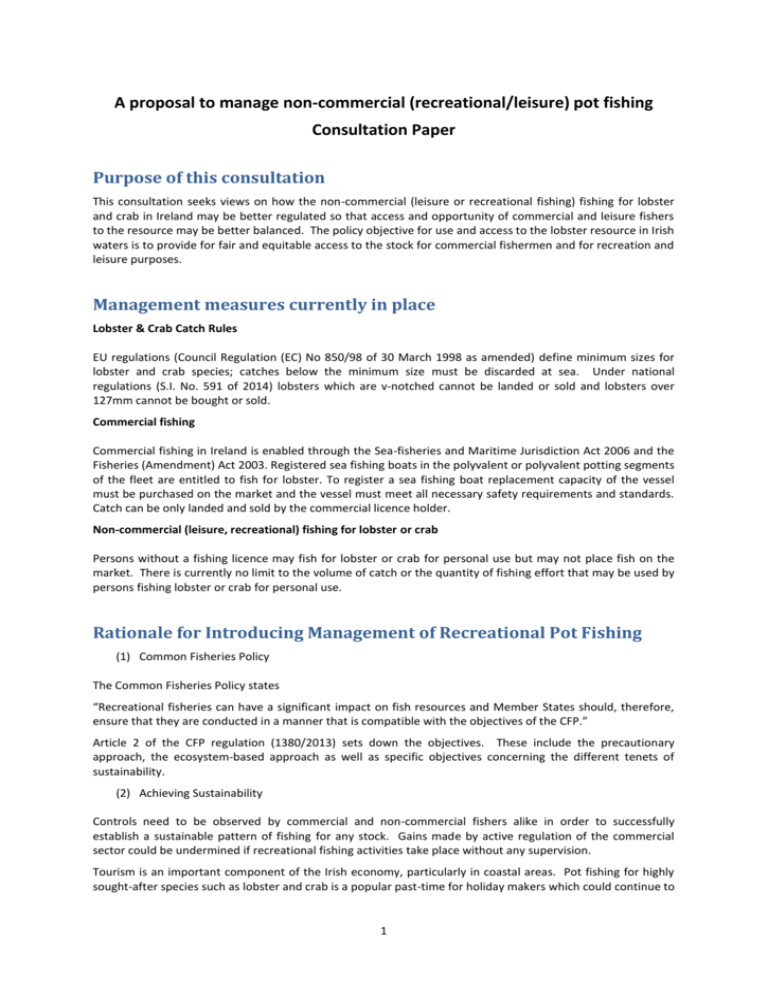
A proposal to manage non-commercial (recreational/leisure) pot fishing Consultation Paper Purpose of this consultation This consultation seeks views on how the non-commercial (leisure or recreational fishing) fishing for lobster and crab in Ireland may be better regulated so that access and opportunity of commercial and leisure fishers to the resource may be better balanced. The policy objective for use and access to the lobster resource in Irish waters is to provide for fair and equitable access to the stock for commercial fishermen and for recreation and leisure purposes. Management measures currently in place Lobster & Crab Catch Rules EU regulations (Council Regulation (EC) No 850/98 of 30 March 1998 as amended) define minimum sizes for lobster and crab species; catches below the minimum size must be discarded at sea. Under national regulations (S.I. No. 591 of 2014) lobsters which are v-notched cannot be landed or sold and lobsters over 127mm cannot be bought or sold. Commercial fishing Commercial fishing in Ireland is enabled through the Sea-fisheries and Maritime Jurisdiction Act 2006 and the Fisheries (Amendment) Act 2003. Registered sea fishing boats in the polyvalent or polyvalent potting segments of the fleet are entitled to fish for lobster. To register a sea fishing boat replacement capacity of the vessel must be purchased on the market and the vessel must meet all necessary safety requirements and standards. Catch can be only landed and sold by the commercial licence holder. Non-commercial (leisure, recreational) fishing for lobster or crab Persons without a fishing licence may fish for lobster or crab for personal use but may not place fish on the market. There is currently no limit to the volume of catch or the quantity of fishing effort that may be used by persons fishing lobster or crab for personal use. Rationale for Introducing Management of Recreational Pot Fishing (1) Common Fisheries Policy The Common Fisheries Policy states “Recreational fisheries can have a significant impact on fish resources and Member States should, therefore, ensure that they are conducted in a manner that is compatible with the objectives of the CFP.” Article 2 of the CFP regulation (1380/2013) sets down the objectives. These include the precautionary approach, the ecosystem-based approach as well as specific objectives concerning the different tenets of sustainability. (2) Achieving Sustainability Controls need to be observed by commercial and non-commercial fishers alike in order to successfully establish a sustainable pattern of fishing for any stock. Gains made by active regulation of the commercial sector could be undermined if recreational fishing activities take place without any supervision. Tourism is an important component of the Irish economy, particularly in coastal areas. Pot fishing for highly sought-after species such as lobster and crab is a popular past-time for holiday makers which could continue to 1 be enjoyed by many without posing a threat to the conservation of the species if measures were introduced to maintain the activity at an appropriate scale. Economic benefits from tourism need to be balanced against the economic sustainability of (often small-scale) commercial fisheries. For a significant number of people the lobster resource provides for economic, and associated social benefits, to residents in many coastal communities, who engage in commercial fishing. This economic dividend is important, maintains hundreds of jobs around the coast and supports a valuable export industry. Lobster is the top priority species for commercial fishermen operating fishing vessels less than 10m in length. Currently the access arrangements for leisure and commercial fishermen is unbalanced because leisure access is not controlled in any way, other than a requirement of non-sale of fish, whereas commercial access is controlled through the requirements for a sea fishing licence, the requirement to fit out a safe and seaworthy vessel and the costs associated with both. There are other aspects to the current arrangement that could be seen as unbalanced and inequitable - Seasonal leisure fishing may be intensive locally and lead to competition for stock with commercial fishermen who rely on the fishery to earn a living. - Unlimited catches in the leisure sector could legitimately be distributed (but not sold) locally and depress local demand at sales outlets (3) Potential Loophole for Illegal Fishing A recurring theme in submissions on the lobster fishery consultation during 2013 was the lack of controls on recreational fishing compared to commercial fishing. A significant number of submissions expressed concerns that (i) recreational fishing was being used as a cover for illegal fishing including sale of catch, (ii) recreational fishing had escalated at certain locations with far too many pots being deployed and (iii) recreational fishers were not always aware of or did not always observe the statutory catch rules. Fishermen and their representative bodies called for controls on recreational fishing to be introduced. These calls are consistent with previous industry engagement on management of the lobster fishery (for example, during the operation of the Shellfish Management Framework from 2005 to 2009). The Sea-Fisheries Protection Authority (SFPA) is also concerned that the fishing effort on lobster by persons not holding commercial licences is very significant locally. Illegal fishing undermines the competitiveness of the commercial fishing sector and poses a threat to the sustainability of the lobster stocks. (4) Cross-Border Co-operation and Consistency Many other jurisdictions have already established controls on recreational fishing, such as the introduction of permit systems, catch limits and limits of the use of pots. For example, various controls are prevalent throughout the UK. In Northern Ireland, daily catch limits and a restriction on the number of pots applies to non-commercial boats. The application of similar controls in this jurisdiction therefore would establish an allisland practice of recreational pot fishing management which would be more easily communicated to all stakeholders, including commercial fishermen and holiday makers. Consideration of Options Option 1 Establish a ban on non-commercial pot fishing. This would have the effective of prohibiting persons other than owners/operators of a registered fishing boat from engaging in pot fishing. This option is not considered a balanced and fair response to the policy objective of providing fair and equitable access. Option 2 A number of measures could be introduced to control the pattern of recreational fishing activities so that it can continue to be successfully enjoyed as a past-time. 2 1. Recreational pot fishing should only be permitted during the summer months (May to September inclusive). 2. The measures (i) to (iii) below should be apply to all boats, other than registered sea-fishing boats: 3. (i) A catch limit of 1 lobster per boat (ii) A catch limit of 5 crabs per boat (iii) A limit of 6 pots per boat, clearly marked and deployed in one location at a time Persons engaged in recreational fishing for crab and lobster would not be permitted to use a store pot/stock cage to hold catch. This Option balances the potential for continued enjoyment as a pastime with the need to manage the activity to deter illegal fishing and support efforts for sustainable stock management. This option would also be costeffective to implement, monitor and enforce at this time. Pots from recreational boats would need to be clearly marked in order to monitor the limit on the number of pots. Commercial fishermen may also consider marking their pots to enhance the distinction and allow for more effective monitoring of the measures. Option 3 In addition to the measures in Option 2, a permit or an online register system could be introduced for noncommercial pot fishing. This approach has been taken in some jurisdictions as a means on monitoring recreational fishing patterns. A permit/register system would generate data on the patterns of recreational fishing which would have scientific benefits and could be used to refine further management of the activity if required (e.g. pot limits, spatial controls, fishing times, etc). Administration fees, at an appropriate price, could fund the operation of the system. In order to be effective the permit system would need to be well communicated and observed by all recreational users. The introduction of a permit system at this time poses resource challenges from financial, administration and enforcement standpoints. Making a submission Submissions can be made online at https://www.surveymonkey.com/r/SLJBZR9 or the submission form here can be completed and emailed or posted to the addresses below. Email: fisheriesconsultation@agriculture.gov.ie with the words ‘pot fishing’ in the subject line. Post to: Non-Commercial Pot Fishing Consultation Marine Agencies & Programmes Division Department of Agriculture Food & Marine National Seafood Centre Clonakilty Co Cork P85 TX47 Closing date for submissions: 21 August 2015 Inshore Fisheries Management Unit, Marine Agencies and Programmes Division, Department of Agriculture, Food and the Marine July 2015 3

